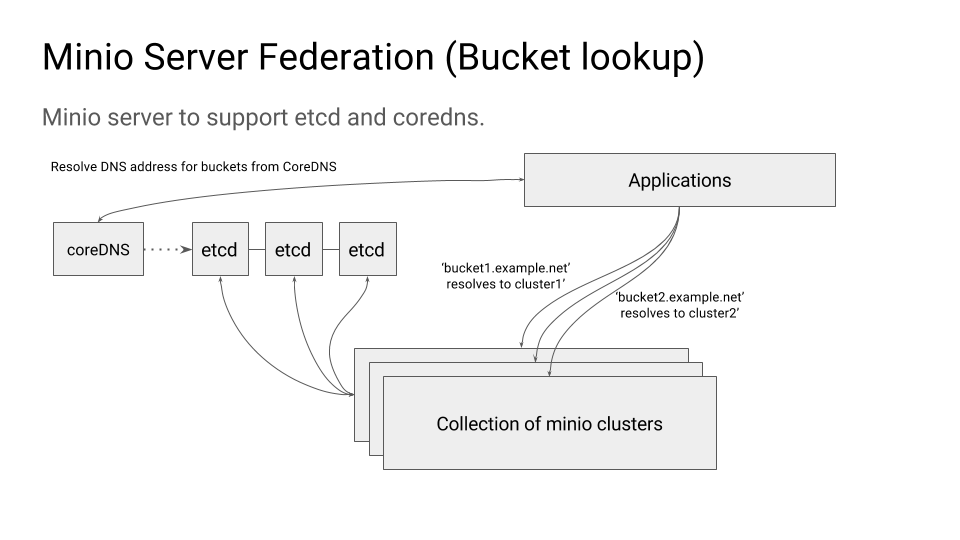- Sort Score
- Result 10 results
- Languages All
Results 1 - 10 of 23 for service (0.15 sec)
-
docs/multi-user/README.md
You can use a policy variable in the Resource element, but only in the resource portion of the ARN. This portion of the ARN appears after the 5th colon (:). You can't use a variable to replace parts of the ARN before the 5th colon, such as the service or account. The following policy might be attached to a group. It gives each of the users in the group full programmatic access to a user-specific object (their own "home directory") in MinIO. ``` {
Plain Text - Registered: Sun May 05 19:28:20 GMT 2024 - Last Modified: Tue Mar 21 06:38:06 GMT 2023 - 8K bytes - Viewed (0) -
docs/multi-user/admin/README.md
## Explore Further - [MinIO Client Complete Guide](https://min.io/docs/minio/linux/reference/minio-mc.html) - [MinIO STS Quickstart Guide](https://min.io/docs/minio/linux/developers/security-token-service.html) - [MinIO Admin Complete Guide](https://min.io/docs/minio/linux/reference/minio-mc-admin.html)
Plain Text - Registered: Sun May 05 19:28:20 GMT 2024 - Last Modified: Tue Mar 21 06:38:06 GMT 2023 - 4.5K bytes - Viewed (0) -
README.md
</a> --- Istio is an open source service mesh that layers transparently onto existing distributed applications. Istio’s powerful features provide a uniform and more efficient way to secure, connect, and monitor services. Istio is the path to load balancing, service-to-service authentication, and monitoring – with few or no service code changes.
Plain Text - Registered: Wed May 08 22:53:08 GMT 2024 - Last Modified: Fri Jan 26 15:28:59 GMT 2024 - 6.6K bytes - Viewed (0) -
README.md
OkHttp perseveres when the network is troublesome: it will silently recover from common connection problems. If your service has multiple IP addresses, OkHttp will attempt alternate addresses if the first connect fails. This is necessary for IPv4+IPv6 and services hosted in redundant data centers. OkHttp supports modern TLS features (TLS 1.3, ALPN, certificate pinning). It can be configured to fall back for broad connectivity.
Plain Text - Registered: Fri May 03 11:42:14 GMT 2024 - Last Modified: Wed Dec 20 23:27:07 GMT 2023 - 6.2K bytes - Viewed (0) -
docs/federation/lookup/README.md
### 2. Run MinIO in federated mode Bucket lookup from DNS federation requires two dependencies - etcd (for bucket DNS service records) - CoreDNS (for DNS management based on populated bucket DNS service records, optional) ## Architecture  ### Environment variables
Plain Text - Registered: Sun May 05 19:28:20 GMT 2024 - Last Modified: Thu Sep 29 04:28:45 GMT 2022 - 4K bytes - Viewed (0) -
docs/docker/README.md
``` Create a MinIO service using `docker service` to read from Docker secrets. ``` docker service create --name="minio-service" --secret="access_key" --secret="secret_key" quay.io/minio/minio server /data ``` Read more about `docker service` [here](https://docs.docker.com/engine/swarm/how-swarm-mode-works/services/) #### MinIO Custom Access and Secret Key files
Plain Text - Registered: Sun May 05 19:28:20 GMT 2024 - Last Modified: Thu Sep 29 04:28:45 GMT 2022 - 8.2K bytes - Viewed (0) -
architecture/README.md
Each process, or "runtime", applies different constraints to the code that runs in that process. For example, each process has different supported JVMs and a different set of services available for dependency injection. While a lot of Gradle source code runs only in the Gradle daemon, not all of it does and so, when working on some source code it is important to be aware of the runtimes in which it will run.
Plain Text - Registered: Wed May 08 11:36:15 GMT 2024 - Last Modified: Thu May 02 06:42:46 GMT 2024 - 2.4K bytes - Viewed (0) -
docs/orchestration/README.md
## Why is MinIO cloud-native?
Plain Text - Registered: Sun May 05 19:28:20 GMT 2024 - Last Modified: Thu Sep 29 04:28:45 GMT 2022 - 2.2K bytes - Viewed (0) -
docs/throttle/README.md
export MINIO_ROOT_USER=your-access-key export MINIO_ROOT_PASSWORD=your-secret-key minio server http://server{1...8}/mnt/hdd{1...16} ``` or ```sh mc admin config set myminio/ api requests_max=1600 mc admin service restart myminio/ ``` > NOTE: A zero value of `requests_max` means MinIO will automatically calculate requests based on available RAM size and that is the default behavior. ### Configuring connection (wait) deadlinePlain Text - Registered: Sun May 05 19:28:20 GMT 2024 - Last Modified: Sat Feb 12 00:51:25 GMT 2022 - 2.4K bytes - Viewed (0) -
docs/metrics/prometheus/README.md
### 4. Update `scrape_configs` section in prometheus.yml To authorize every scrape request, copy and paste the generated `scrape_configs` section in the prometheus.yml and restart the Prometheus service. ### 5. Start Prometheus Start (or) Restart Prometheus service by running ```sh ./prometheus --config.file=prometheus.yml ```
Plain Text - Registered: Sun May 05 19:28:20 GMT 2024 - Last Modified: Fri Apr 12 15:49:30 GMT 2024 - 7.1K bytes - Viewed (0)